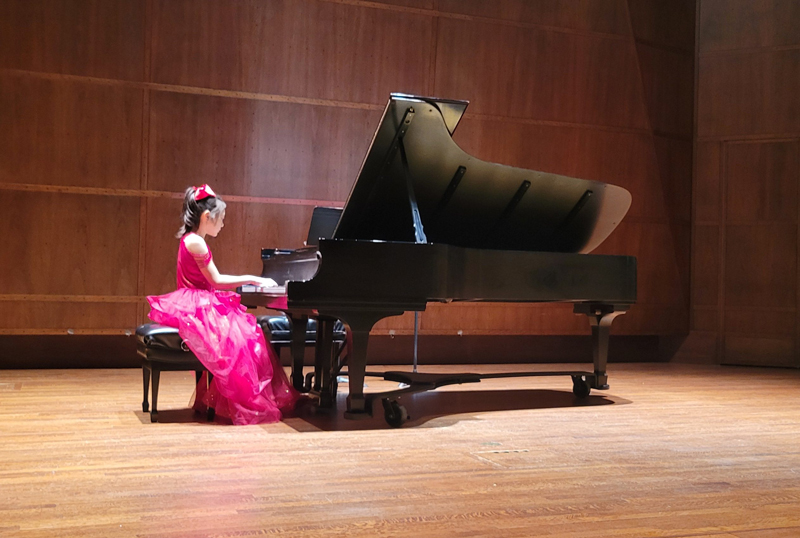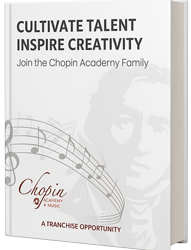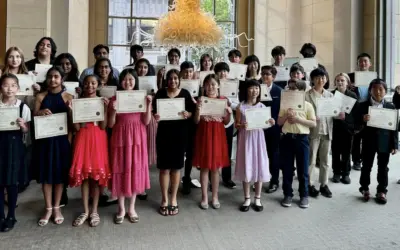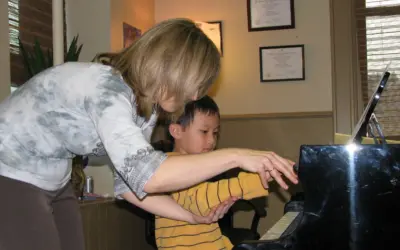You didn’t spend years studying music just to feel like you’re playing the same tune every day.
You love teaching. You love seeing students light up when they finally get it. But lately, every “music teacher job” you scroll past feels like another encore of the same song, low pay, packed schedules, and no real room to grow.
The truth is, you didn’t fall in love with music to feel limited. You did it to inspire, to create, and to build something lasting. Maybe it’s time your career lets you do the same.
The Reality of Music Teaching Jobs Today
Let’s be honest. Most music teaching jobs are… fine. You get to share what you love. You watch students have those lightbulb moments. Some days, a kid nails that tricky passage, and you remember why you’re doing this.
But then there’s everything else.
The salary that hasn’t budged in years. The elementary music teacher jobs where you’re teaching 200 kids a week out of a cart in the hallway. The constant hustle of piecing together private lessons just to make rent. The realization that in five years, you’ll probably be doing the same thing, for roughly the same money.
Over 123,000 music teachers in the U.S. are navigating this reality right now. And while the field is projected to grow about 3.1% by 2032, the opportunities for actual career advancement? Those aren’t growing nearly as fast.
What Music Teachers Actually Make
Let’s talk numbers, because nobody else seems to want to:
- Elementary School Music Teachers: $48,000 – $70,000/year
You’re salaried, which means stability — but it also means your income caps quickly. And those jobs? Highly competitive. - Private Music Teachers: $30 – $80/hour
Sounds great until you factor in cancellations, summer drop-offs, and the reality that you’re running a one-person business with zero safety net. One month you’re booked solid; the next, you’re wondering how to cover bills. - Freelance/Online Instructors: All over the map
Total freedom, total uncertainty. Constant hustle for the next student, the next gig, the next paycheck. - College Professors: Starting around $36,000/year
You went all the way — bachelor’s, master’s, maybe even a doctorate in performance — only to find a handful of tenure-track jobs with starting salaries and benefits that may not carry you to retirement.
After years of study and sacrifice, the reward often doesn’t match the effort or expertise.
The Hidden Ceiling Nobody Talks About
Here’s what kills me about most music teaching jobs: the ceiling is visible from day one.
You know that teacher who’s been at your school for 15 years, the one everyone respects, who’s phenomenal with students, who’s basically irreplaceable? They’re making maybe $8,000 more than you. That’s your future if you stay on this path.
Or maybe you’re the private teacher with 35 weekly students, exhausted and maxed out. You’ve reached your physical limit, and you’re still worried about making rent if you get sick for a week.
The problem isn’t your effort. It’s the system.
The traditional model caps your potential because your income is tied directly to your hours, and you only have so many.
The Question Nobody Asks
What if you could keep teaching, but without being confined by the hours in your day?
What if you could guide other teachers, shape entire programs, and reach hundreds of students instead of just the few you can personally fit into your week?
What if, instead of endlessly searching for better music teacher jobs, you became the one who creates them, and changes what “a music career” can mean for others?
That’s not a dream. It’s a quiet revolution already happening in music education.
The Music Education Market Is Booming, Without You
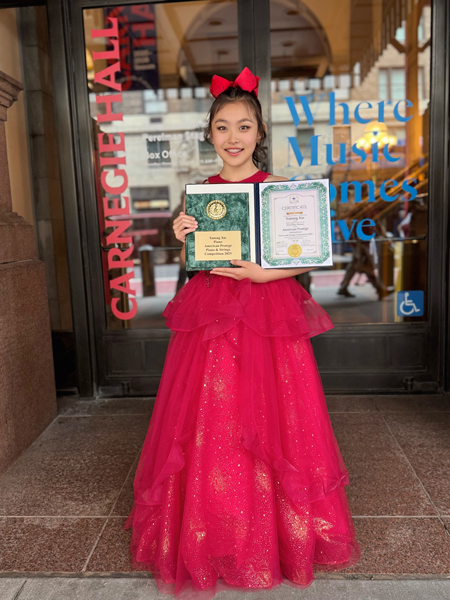
While you’re earning $40 a lesson, the global music education market is booming, set to grow from $6.3 billion in 2023 to $11.2 billion by 2032. Parents are investing more than ever in high-quality instruction. Even classical music is making a comeback.
But here’s the catch:
That growth isn’t going to the teachers hustling for hourly pay, or the adjuncts piecing together part-time gigs. It’s going to the people who own the infrastructure, the schools, academies, and programs that can reach hundreds of students at once.
And there’s no reason you can’t be one of them.
From Searching to Building: A Different Mindset
Switching from employee to owner is a leap, but consider what you’re already risking:
- The certainty that your income will plateau
- The knowledge that a single illness or budget cut could upend your stability
- The quiet realization that you’re building someone else’s dream, not your own
Those are risks too, just quieter ones.
What Ownership Actually Looks Like
When music teachers move from finding jobs to building academies, they don’t abandon teaching, they expand what teaching can mean.
Chelsea Bloomberg, one of our longtime instructors, has seen that transformation firsthand. She describes Chopin Academy as “an ideal place to build a teaching career,” where she works with “quality students whose families commit long-term.”
That’s not the churn of public school or the instability of freelancing. It’s a sustainable, respected role inside a thriving program.
Ben Klinger, manager of a regional piano dealership and a longtime supporter of Chopin Academy, has seen this model from the outside, and he’ll tell you it works. He’s watched our academies grow into vibrant communities that impact hundreds of students each year.
That’s the scale difference, from teaching dozens to influencing hundreds.
What You’re Actually Building
When you own a music academy, you’re creating:
- Scalable income. You earn not just from lessons, but from teachers you hire and programs you develop.
- Career paths for others. You become the solution to the shortage of rewarding teaching jobs.
- A genuine community hub. A place where families commit and students grow.
- An asset you own. Something that won’t disappear with the next policy change.
Why Franchising Makes Sense
Starting a school from scratch is overwhelming. Curriculum, marketing, operations, hiring, facilities, all while trying to teach.
That’s why the franchise model works for educators. You partner with people who’ve already built a successful system.
The Chopin Academy of Music, founded in Seattle in 2005 by two professional musicians, has spent nearly two decades refining its curriculum, teacher support, and brand reputation.
As a franchise owner, you get access to all of that: proven curriculum, training, marketing, and operational playbooks. You’re not reinventing the wheel, you’re scaling a model that already works.
The Real Investment Question
The total investment for a Chopin Academy franchise ranges from $184,946 to $465,192, including a $40,000 franchise fee.
Yes, it’s a significant investment.
But let’s put that in context:
How much have you already spent on your degrees?
How much will your current job pay you over the next decade?
And how much will your career grow if you change nothing?
The franchise investment isn’t just buying a business, it’s buying infrastructure, support, and a path for growth.
It’s choosing to build equity instead of endlessly trading hours for dollars.
What This Isn’t
This isn’t a get-rich-quick pitch.
You’ll work hard, maybe harder than you do now. You’ll manage payroll, marketing, and people.
But if you’re the kind of teacher who looks at your career and thinks, “I want more impact, more control, and a bigger vision,” then this might be exactly what you’ve been searching for.
The Path Forward
- Be honest about where you are.
Are you satisfied with your trajectory? Where will it lead in 5–10 years? - Do your research.
Download the Chopin Academy Franchise Guide. Review the numbers. Talk to real people involved. - Decide if you’re ready to grow.
Leadership, business, and community-building skills can all be learned, especially with structured training and support.
The Bottom Line
If you’re genuinely happy and fulfilled in your current teaching role, stay there. The world needs passionate, dedicated educators, and your work matters.
But if you’re feeling stuck, if you’ve hit the ceiling on income or impact and know you’re capable of more, it’s time to take the next step.
You can stop searching for better music teacher jobs and start creating them.
You can build an academy that reflects your values, uplifts your community, and delivers the kind of music education you’ve always believed in. The Chopin Academy of Music franchise is one way to make that vision real.
Because the real transformation isn’t just professional, it’s personal.
It’s the shift from employee to owner, from searching to building, from limited to limitless.
Take the Next Step
You became a teacher because you love music, because helping others discover it felt like purpose, not work.
But loving music doesn’t mean you have to stay in a system that limits you.
It might be time to build something of your own.
Something lasting.
Something that reflects your values and amplifies your impact.
Download the Chopin Academy of Music Franchise Guide and see how your passion for teaching could become the foundation for something bigger.
